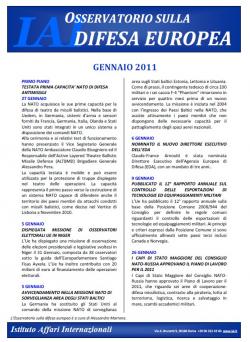Observatory on European defence, February 2004
10 February 2004
Political and Security Committee (PSC), Trilateral proposal - Reaction Forces
On 10 February, France, UK and Germany submitted a proposal to the EU PSC to develop the European Reaction Forces, based on a bilateral (Anglo-French) initiative subsequently joined by Germany.
It foresees the establishment by 2007 of a rapid intervention force, open to the contributions of all members, composed of 1,500 men deployable on short notice (15 days) and for up to one month (extendable to three months).
The proposal will be considered by the Military Committee and then by the informal defence Council that will be held in April, in view of possible European adoption at the 17-18 May Summit.
23 February 2004
EU External Relations Council - Missions, Financing, Third Countries, SFOR
The EU External Relations Council discussed several ESDP (European Security and Defence Policy) development issues.
In particular, the Council adopted a decision on the common financing of costs connected to military missions, based on a permanent mechanism called ‘Athena’.
Moreover, the Council authorized the Presidency to negotiate with third countries their participation in EU crisis management operations.
Finally, the Council discussed the conditions for the EU take over of the NATO SFOR military mission in Bosnia, the main issue of the NAC (North Atlantic Council) - PSC (Political and Security Committee) meeting held on 16 February.
25 February 2004
NATO Secretary General, European Parliament - EU-NATO Relations
On 25 February, the NATO Secretary General, Jaap de Hoop Scheffer, attended the Committee for Foreign Affairs of the European Parliament, debating EU-Atlantic Alliance relations.
Among the priorities identified:
- a common commitment to the fight against terrorism
- collaboration for a new partnership initiative in the Mediterranean and the Middle East
- the EU takeover of the NATO SFOR mission in Bosnia
- the need to establish mechanisms for cooperation between the rapid reaction forces of the two organizations, according to a principle of complementarity instead of a geographical division of competences.
De Hoop Scheffer touched on several issues that were discussed by the EU Defence Ministers gathered for the traditional NATO informal meeting in Munich on 7-8 February.
24-26 February 2004
EU-USA Meeting - Galileo and GPS (Global Positioning System)
According to a communiqué issued on 26 February, after a two-day meeting between the European Commission and the US Department of State, held in Brussels on 24-25 February, the EU and US concluded their long and difficult talks with a framework agreement on the rules for cohabitation of their respective satellite navigation, positioning and timing systems, Galileo and GPS.
The formalization of the agreement and of related details will take place in the coming months, in view of a definitive adoption at the EU-US summit in June.
The security implications of the future European Galileo system have been a matter of US concern from the beginning.
According to the details made public, the compromise reached is based on the principle of same dignity, autonomy and collaboration, and fulfils many of the reciprocal requirements, concerning non-superimposed frequency allocation and the prospect of future autonomous development of the systems, but does not solve once and for all the problem of management of respective signals in crisis situations and in time of war.
The problem of the possible transfer of sensitive technologies to third countries also remains partially unsolved.
-
Details
Roma, Istituto affari internazionali, 2004 -
Issue
04/02



